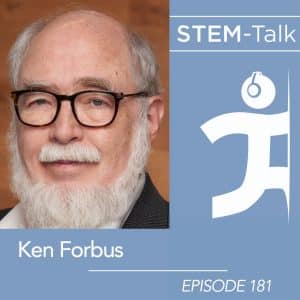STEM-Talk: Ken Forbus on AI and his development of the Structure Mapping Engine
Published 5.13.25
Episode 181 of STEM-Talk offers a meeting of some truly great minds in the field of artificial intelligence. It is available now on our website and wherever you listen to podcasts.
The conversation features three fellows of the American Association for Artificial Intelligence:
- Northwestern University’s Dr. Ken Forbus.
- IHMC founder Dr. Ken Ford.
- And retired associate director of IHMC Dr. James Allen.
Forbus is the Walter P. Murphy Professor of Computer Science and a Professor of Education at Northwestern University. He was the inaugural winner of the Herbet A. Simon Prize for Advances in Cognitive Systems.
 Co-hosts Ford and Allen interview Forbus about his development of the Structure Mapping Engine. In artificial intelligence and cognitive science, the Structure Mapping Engine is a computer simulation of analogy and similarity comparisons that helped pave the way for computers to think like humans.
Co-hosts Ford and Allen interview Forbus about his development of the Structure Mapping Engine. In artificial intelligence and cognitive science, the Structure Mapping Engine is a computer simulation of analogy and similarity comparisons that helped pave the way for computers to think like humans.
The conversation leads from Forbus’ early life in a family the raised and bred horses to his innovative work in a field he helped pioneer. The three AAAI fellows also have a fascinating discussion about the ethical guardrails that are needed as AI becomes more human-like.
One hint: It will require a lot more than simply meeting the Turing Test and declaring victory.
“The problem with the Turing Test is when it comes to interaction, we’re all like Fox Mulder (on the ‘X-Files’): We want to believe. We will believe anything. Simple string-based chatbots have been fooling people since the 1960s,” Forbus says.
As Ford notes, the media focus on chatbots has obscured other methods of AI that are used all of the time. It is as if, Ford notes, the broad public believes chatbots are all there is to AI, when, as this episode shows, that couldn’t be farther from the truth.
“There are so many other things going on that are not in the popular press,” Forbus says.
In this episode, listeners will learn about:
- The three revolutions that are going on in AI right now.
- How, Forbus as a self-described nerdy kid, grew up in a family that bred and raised horses. “The thing about calf-roping is, it’s a lot easier if the horse knows what it’s doing. Their job is to keep the rope taut so you can swing down and rope and quickly tie the calf. When you think about it, compare a horse to a self-driving car. A horse really works hard to not get itself and you killed. And if we have self-driving cars that worked more like horses, we’d be better off.”
- How AI intrigued him from an early age, and especially how he learned from the library at the University of Arizona’s collection of works written about AI — “two whole shelves” — in the early 1970s.
- The splash his 1984 paper on Qualitative Process Theory made on the world of AI. “We are surrounded by continuous phenomena. Things move, flow, heat up, cool down. Qualitative Process Theory, he says, creates a language for a kind of mental model to make predictions about the world, no numbers or equations needed.
- His collaboration with his wife Dr. Dedre Gentner on the Structure Mapping Engine project. This theory explains how people understand and reason about relationships between different situations, which is central to human cognition. It was foundational for the Structure Mapping Engine.
- How Structure Mapping Engine has changed and improved over time.
- His goal to create systems that can interact with people as apprentices or collaborators rather than just tools.
- Forbus’ book “Qualitative Representations: How People Reason and Learn About the Continuous World” which proposes that qualitative representations, which are symbolic representations that carve continuous phenomena into meaningful units, hold the key to one of the deepest mysteries of cognitive science and are central to human cognition.
IHMC is a not-for-profit research institute of the Florida University System where researchers pioneer science and technology aimed at leveraging and extending human capabilities. IHMC researchers and staff collaborate extensively with the government, industry and academia to help develop breakthrough technologies. IHMC research partners have included: DARPA, the National Science Foundation, NASA, Army, Navy, Air Force, National Institutes of Health, IBM, Microsoft, Honda, Boeing, Lockheed, and many others.
Latest News
- STEM-Talk: Francisco Gonzalez-Lima on methylene blue and noninvasive brain stimulation
- STEM-Talk: Judith Curry and the Consequences of Climate Alarmism
- STEM-Talk: NASA’s Flawed Plan to Return to the Moon – with Mike Griffin and Lisa Porter
- IHMC partners with Conduit Venture Labs to accelerate commercialization efforts
- Research platforms aim to better support military personnel in high-stress environments
- Study for U.S. Air Force Research Lab tracks impact of ketones on pilot ventilation
- National Institute on Aging funded study tracks changes to gait as we age
- Meet Alex, IHMC’s next generation humanoid robot
- Decades of AI-expertise fuel growth of National Center for Collaborative Autonomy

